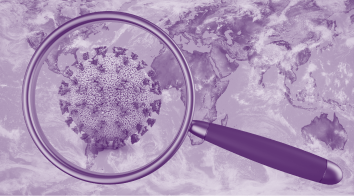Life Sciences
Industry
Life Sciences
Industry
The pharmaceutical and life sciences industry has seen tremendous change in the last few years.
Apart from the rising inflation and uncertain economic forecast that most markets are facing, pharmaceutical companies also had to navigate a surge in demand during the Covid-19 pandemic, ever-changing world-wide compliance regulations, and an evolving supply chain.
To survive in a competitive market, many companies prioritized short-term goals such as cost reduction over long-term operations strategies. This has to change.
As client expectations once again begin to shift, life science businesses are struggling to quickly deliver high-quality products while maintaining complicated, often disconnected operation infrastructure and outdated legacy systems. The pharmaceutical market demands optimized, interconnected operations. Without a significant investment in digital transformations, your business won’t be able to compete in the long-term.

Evolution of the Pharma Industry: A Decade of Transformation
2010-2015
2016-2019
2020
2010-2015

Traditional Pharma
Landscape
- Dominance of traditional drug development and manufacturing.
- Limited technological integration.
- Conventional supply chain practices.
2016-2019

Rise of
Biotechnology
- Surge in biotechnology-driven drug development.
- Emphasis on precision medicine and targeted therapies.
- Evolution of biopharmaceutical manufacturing.
2020

The Impact of
COVID-19
- Accelerated focus on vaccine development and distribution.
- Enhanced collaboration and information sharing.
- Supply chain disruptions and increased emphasis on resilience.
Customer Expectation
2010-2023
2010-2023
2010-2023
Personalized Medicine
- Growing demand for personalized treatment approaches.
- Advances in genomics and biomarker discovery.
- Tailoring therapies based on individual patient profiles.
2010-2023
Digital Health Integration
- Adoption of digital technologies in healthcare.
- Telemedicine, remote patient monitoring, and digital therapeutics.
- Improved patient engagement and adherence.
Supply Chain
2015-2023
2010-2023
2015-2023
Digitization and Track-and-Trace
- Integration of digital technologies for supply chain visibility.
- Implementation of track-and-trace systems.
- Improved efficiency and compliance.
2018-2023
Globalization and Outsourcing
- Increasing globalization of the pharmaceutical supply chain.
- Outsourcing of manufacturing and research processes.
- Focus on cost-effectiveness and flexibility.
Impact
2020-2021
2020-2023
2020-2021

Vaccine Development
- Unprecedented speed in vaccine development.
- Global collaboration for research and distribution.
- Highlighted the industry’s crucial role in public health.
2020-2023

Digital Transformation Acceleration
- Accelerated adoption of digital solutions.
- Remote clinical trials and virtual drug launches.
- Increased use of AI in drug discovery and development.

Conclusion
Future Outlook
(2023 onwards)
- Continued emphasis on precision medicine and personalized therapies.
- Integration of advanced technologies like AI and machine learning.
- Ongoing efforts to enhance supply chain resilience and efficiency.
Key Challenges
Managing regulatory compliance expectations
How InspireXT can help
Investing in research and development
How InspireXT can help
Integrating data management systems
How InspireXT can help
Complying with Good Manufacturing Practice (GMP) standards
- Quality Control and Assurance
- Validation of Manufacturing Process
- Supply Chain Management
- Technology and Automation
- Change Control and Deviation Management
How InspireXT can help
Overseeing complex supply chains
How InspireXT can help
Product Traceability
How InspireXT can help
How InspireXT addresses these challenges with Life Sciences Services/Solutions
Request for services
Find out more about how we can help your organization navigate its next. Let us know your areas of interest so that we can serve you better.


